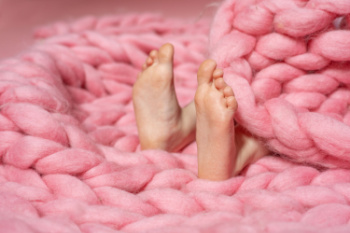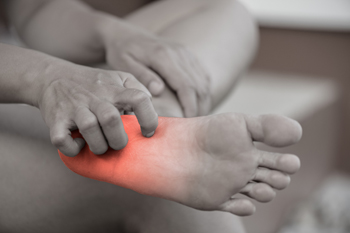Items filtered by date: September 2024
Heel Pain Can Be Treated!
Foot Exercises for Balance and Strength

Maintaining strong and balanced feet is essential for overall stability and mobility. One effective exercise is toe raises, which involves lifting your heels off the ground while standing on your toes to strengthen the calf muscles and improve balance. Another beneficial exercise is the toe and heel walk, where you walk on your toes for a few steps and then switch to walking on your heels. This helps enhance both strength and coordination. Foot doming is also useful. While sitting, try to create an arch in your foot by lifting the middle of the foot and keeping your toes and heel on the ground. Lastly, resistance band exercises like pulling the band with your toes while seated, can strengthen the foot’s intrinsic muscles. If you have sustained an injury due to weak foot muscles, it is suggested that you contact a podiatrist who can offer the correct treatment options.
Exercising your feet regularly with the proper foot wear is a great way to prevent injuries and build strength. If you have any concerns about your feet, contact one of our podiatrists from North Penn Podiatry. Our doctors can provide the care you need to keep you pain-free and on your feet.
Exercise for Your Feet
Exercise for your feet can help you gain strength, mobility and flexibility in your feet. They say that strengthening your feet can be just as rewarding as strengthening another part of the body. Your feet are very important, and we often forget about them in our daily tasks. But it is because of our feet that are we able to get going and do what we need to. For those of us fortunate enough to not have any foot problems, it is an important gesture to take care of them to ensure good health in the long run.
Some foot health exercises can include ankle pumps, tip-toeing, toe rises, lifting off the floor doing reps and sets, and flexing the toes. It is best to speak with Our doctors to determine an appropriate regimen for your needs. Everyone’s needs and bodies are different, and the activities required to maintain strength in the feet vary from individual to individual.
Once you get into a routine of doing regular exercise, you may notice a difference in your feet and how strong they may become.
If you have any questions please feel free to contact our offices located in Lansdale, and King of Prussia, PA . We offer the newest diagnostic and treatment technologies for all your foot and ankle needs.
How Are Foot Corns Treated?

Foot corns are thickened areas of skin that develop due to repeated friction or pressure, often from wearing ill-fitting shoes. They commonly appear on the toes or the soles of the feet and can cause discomfort or pain. Corns are categorized into hard corns, which form on bony areas, and soft corns, which develop between the toes where moisture softens the skin. They often result from wearing tight, narrow shoes or high heels that create pressure points. Proper diagnosis involves examining the corn, assessing footwear and walking patterns. Treatment typically includes wearing properly fitted shoes, using cushioning pads, and removing excess skin through professional care. If you have persistent corns, it is suggested that you consult a podiatrist for targeted treatment, as well as assessing the underlying cause of the friction to prevent recurrence.
If you have any concerns regarding your feet and ankles, contact one of our podiatrists of North Penn Podiatry. Our doctors will treat your foot and ankle needs.
Corns: What Are They? and How Do You Get Rid of Them?
Corns can be described as areas of the skin that have thickened to the point of becoming painful or irritating. They are often layers and layers of the skin that have become dry and rough, and are normally smaller than calluses.
Ways to Prevent Corns
There are many ways to get rid of painful corns such as wearing:
- Well-fitting socks
- Comfortable shoes that are not tight around your foot
- Shoes that offer support
Treating Corns
Treatment of corns involves removing the dead skin that has built up in the specific area of the foot. Consult with Our doctors to determine the best treatment option for your case of corns.
If you have any questions please feel free to contact our offices located in Lansdale, and King of Prussia, PA . We offer the newest diagnostic and treatment technologies for all your foot and ankle needs.
Conservative Treatment for Congenital Foot Problems

Congenital foot problems are deformities or conditions present at birth that affect the structure and function of the feet. Common congenital foot issues include clubfoot, flat feet, and toe deformities such as overlapping or webbed toes. These conditions can range from mild to severe, impacting a child's ability to walk, balance, and engage in physical activities. Early detection is critical for effective management. Conservative treatments often begin with gentle manipulation and stretching exercises to improve foot alignment. For more structured support, custom orthotics or braces may be used to guide the foot into a more natural position as the child grows. Targeted exercises play a significant role in strengthening the muscles and improving mobility. In some cases, casting or splinting is recommended to gradually correct the deformity. While surgery is an option for more severe cases, many congenital foot problems can be managed conservatively, allowing children to develop healthy, functional feet as they grow. If your child is born with a foot condition, it is strongly suggested that you schedule an appointment with a podiatrist as quickly as possible to get treatment underway.
Congenital foot problems require immediate attention to avoid future complications. If you have any concerns, contact one of our podiatrists of North Penn Podiatry. Our doctors can provide the care you need to keep you pain-free and on your feet.
Congenital foot problems are deformities affecting the feet, toes, and/or ankles that children are born with. Some of these conditions have a genetic cause while others just happen. Some specific foot ailments that children may be born with include clubfeet, polydactyly/macrodactyly, and cleft foot. There are several other foot anomalies that can occur congenitally. What all of these conditions have in common is that a child may experience difficulty walking or performing everyday activities, as well as trouble finding footwear that fits their foot deformity. Some of these conditions are more serious than others. Consulting with a podiatrist as early as possible will help in properly diagnosing a child’s foot condition while getting the necessary treatment underway.
What are Causes of Congenital Foot Problem?
A congenital foot problem is one that happens to a child at birth. These conditions can be caused by a genetic predisposition, developmental or positional abnormalities during gestation, or with no known cause.
What are Symptoms of Congenital Foot Problems?
Symptoms vary by the congenital condition. Symptoms may consist of the following:
- Clubfoot, where tendons are shortened, bones are shaped differently, and the Achilles tendon is tight, causing the foot to point in and down. It is also possible for the soles of the feet to face each other.
- Polydactyly, which usually consists of a nubbin or small lump of tissue without a bone, a toe that is partially formed but has no joints, or an extra toe.
- Vertical talus, where the talus bone forms in the wrong position causing other bones in the foot to line up improperly, the front of the foot to point up, and the bottom of the foot to stiffen, with no arch, and to curve out.
- Tarsal coalition, when there is an abnormal connection of two or more bones in the foot leading to severe, rigid flatfoot.
- Cleft foot, where there are missing toes, a V-shaped cleft, and other anatomical differences.
- Macrodactyly, when the toes are abnormally large due to overgrowth of the underlying bone or soft tissue.
Treatment and Prevention
While there is nothing one can do to prevent congenital foot problems, raising awareness and receiving neonatal screenings are important. Early detection by taking your child to a podiatrist leads to the best outcome possible.
If you have any questions please feel free to contact our offices located in Lansdale, and King of Prussia, PA . We offer the newest diagnostic tools and technology to treat your foot and ankle needs.
Key Signs to Watch for in Foot Neuropathy

Foot neuropathy, a condition affecting the nerves in the feet, presents several noticeable signs. Tingling or a pins and needles sensation is a common early indicator, often accompanied by numbness. Weakness in the feet may lead to difficulty with tasks like walking or standing. Some individuals with neuropathy may also experience loss of balance, making them prone to falls and accidents. Muscle cramping can occur, causing discomfort and interfering with normal movement. These symptoms often signal nerve damage or poor circulation, which may require medical attention. If you have any of the above symptoms, it is strongly suggested that you talk with a podiatrist who can help manage this condition.
Neuropathy
Neuropathy can be a potentially serious condition, especially if it is left undiagnosed. If you have any concerns that you may be experiencing nerve loss in your feet, consult with one of our podiatrists from North Penn Podiatry. Our doctors will assess your condition and provide you with quality foot and ankle treatment for neuropathy.
What Is Neuropathy?
Neuropathy is a condition that leads to damage to the nerves in the body. Peripheral neuropathy, or neuropathy that affects your peripheral nervous system, usually occurs in the feet. Neuropathy can be triggered by a number of different causes. Such causes include diabetes, infections, cancers, disorders, and toxic substances.
Symptoms of Neuropathy Include:
- Numbness
- Sensation loss
- Prickling and tingling sensations
- Throbbing, freezing, burning pains
- Muscle weakness
Those with diabetes are at serious risk due to being unable to feel an ulcer on their feet. Diabetics usually also suffer from poor blood circulation. This can lead to the wound not healing, infections occurring, and the limb may have to be amputated.
Treatment
To treat neuropathy in the foot, podiatrists will first diagnose the cause of the neuropathy. Figuring out the underlying cause of the neuropathy will allow the podiatrist to prescribe the best treatment, whether it be caused by diabetes, toxic substance exposure, infection, etc. If the nerve has not died, then it’s possible that sensation may be able to return to the foot.
Pain medication may be issued for pain. Electrical nerve stimulation can be used to stimulate nerves. If the neuropathy is caused from pressure on the nerves, then surgery may be necessary.
If you have any questions, please feel free to contact our offices located in Lansdale, and King of Prussia, PA . We offer the newest diagnostic and treatment technologies for all your foot care needs.

